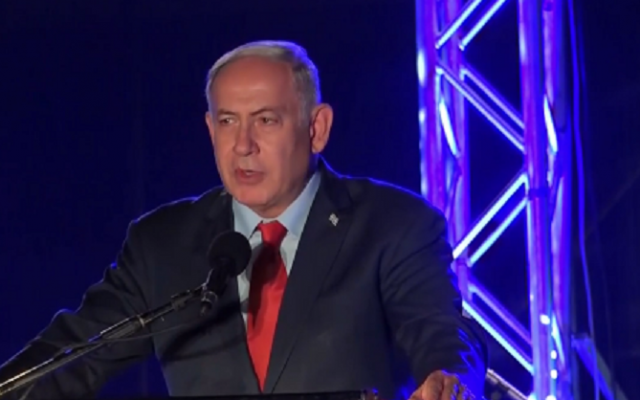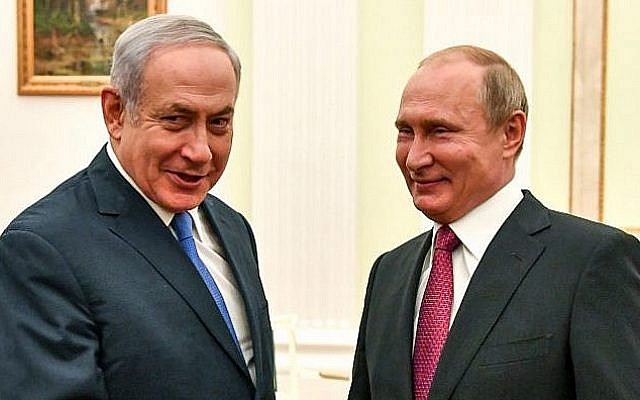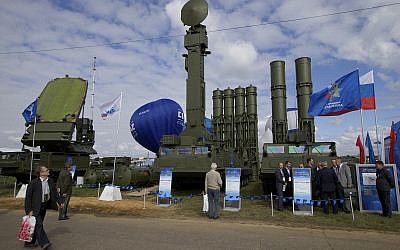Visiting newly opened site of ancient synagogue, PM vows to remain in Golan, ‘otherwise Iran and Hezbollah will be sitting on the shores of the Sea of Galilee’

Prime Minister Benjamin Netanyahu on Monday vowed during a visit to the Golan Heights to hold on to the disputed territory and insisted that Russia understands Israel’s need to act beyond the northern border to maintain its security.
Israeli-Russian relations have become strained over the downing of a Russian spy aircraft by Syrian forces responding to an Israeli strike over Syrian airspace. Moscow has blamed Israel for the incident, which killed 15 Russian crew members, and in response has provided its advanced S-300 air defense system to Syrian forces.
Speaking at the opening ceremony of new a national heritage site in the Golan Heights, Netanyahu said: “I know [Russian president Vladimir] Putin understands my commitment to Israeli security and I know he also understands the importance I place on the Golan.”
Israel has carried out numerous airstrikes in Lebanon and Syria against Hezbollah and Iranian targets, and has said it will not allow Tehran and its proxy terror group to entrench themselves in war-torn Syria.
“We see what is happening beyond the border, unbridled barbarism and attempts by Iran and Hezbollah to set up base. We will stand firm against them,” he said. “Iran and Hezbollah are ceaselessly attempting to form a force that will operate against us, against the Golan and against the Galilee.

“We are preventing them from entrenching themselves and we will continue to act with determination to counter attempts to provide Hezbollah with lethal weapons.”
The premier said he would discuss the northern threats in an upcoming meeting with Putin which he on Sunday announced would take place “soon.” He noted, “Together we’ve developed good relations between Russia and Israel.”
Netanyahu was speaking at the opening of the Ein Kashtot site, where an ancient synagogue from the Mishnaic period (first to third century AD) has been dug up and reconstructed over the past 15 years.
Netanyahu added that beyond the Jewish state’s “ancient rights” to the Golan Heights, which it conquered from Syria during the 1967 Six Day War, the region was a necessary bulwark against attacks.
“Israeli presence in the Golan guarantees security. Israeli presence in the Golan is a fact the international community must accept. As long as it is up to me, the Golan will remain under Israeli sovereignty — otherwise Iran and Hezbollah will be sitting on the shores of the Sea of Galilee,” he said.
Since the downing of the IL-20 spy plane on September 17, Israel’s relationship with Moscow has rapidly deteriorated.
Although Putin initially told reporters that the incident was the result of a “chain of tragic accidental circumstances,” the Russian defense ministry later declared Israel was responsible, saying the IAF jets used the Russian plane as cover.
Israel and its allies for years have lobbied Russia not to give Syria and other regional players the S-300 system, arguing that it would limit Israel’s ability to neutralize threats, including by the Lebanon-based Hezbollah.

The S-300 system, considered one of the most advanced in the world, has a radius of some 200 kilometers, meaning a battery placed near Damascus would cover much of Israel.
Russia, which is a main backer of Syrian President Bashar Assad, has maintained a deconfliction hotline with Israel, allowing the Jewish state to carry out the attacks as long as it is informed beforehand.
Last Thursday, US General Joseph Votel, who heads the US Central Command, called the Russian S-300 deployment in Syria a “needless escalation.”
Moscow has reportedly been working to open avenues of communication between Jerusalem and Tehran to reduce tensions and friction in Syria. Citing a senior Russian source, the London-based Arabic daily Asharq Al-Awsat reported Saturday that this came in light of Moscow’s decision to provide the Assad regime with the S-300.
The prime minister also commented on Sunday’s West Bank terror attack in which two Israelis were killed, vowing Israeli security forces would track down the Palestinian terrorist, who fled after the shooting.
“We’ll catch the despicable murderer and settle the score with him. The blood of Israeli citizens is not cheap,” Netanyahu said.
As reported by The Times of Israel
